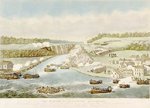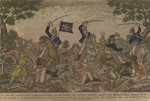- Thread starter
- #21
michaelmaltby
Colonel
From the Globe and Mail, Peter Jones ...
".... But the real legacy of the War of 1812, government claims aside, is simply that there was never a repeat. Tensions remained, small cross-border incursions took place, and fortifications continued to be built and maintained for another half-century, but the primary lesson both sides drew (and which was slowly reinforced) was not to bother again.
This may sound rather uninspiring – it is difficult to gather a group of colourfully dressed re-enactors to flail around in a field but not actually fight each other – but it probably explains much in terms of the incredible success North America's two northern nations have enjoyed since.
For from the War of 1812, and its aftermath of avoiding another conflict, slowly emerged what might be called the North American regional consensus. It is now largely unspoken; most who live here probably couldn't articulate it if they had to, but it has dominated the lives of both countries, and especially Canada, ever since.
Simply put, the North American regional consensus boils down to a realization that the cost of fighting for any possible treasure on the other side of the border is patently ridiculous when it is simply easier and cheaper to exchange these things by trade; that two quite different systems of government can coexist perfectly well; and (for Canadians) that maintaining stability and security in the northern half of the continent ourselves means that the United States will not feel compelled to do it for us.
We may take all of this for granted, but we shouldn't. It took those sophisticated Europeans another 150 years (and two of the bloodiest wars in history) to figure it out. Most regions of the world still haven't ..."
[Peter Jones is an associate professor in the Graduate School of Public and International Affairs at the University of Ottawa and a 2012 visiting scholar at the Hoover Institution at Stanford University.]
".... But the real legacy of the War of 1812, government claims aside, is simply that there was never a repeat. Tensions remained, small cross-border incursions took place, and fortifications continued to be built and maintained for another half-century, but the primary lesson both sides drew (and which was slowly reinforced) was not to bother again.
This may sound rather uninspiring – it is difficult to gather a group of colourfully dressed re-enactors to flail around in a field but not actually fight each other – but it probably explains much in terms of the incredible success North America's two northern nations have enjoyed since.
For from the War of 1812, and its aftermath of avoiding another conflict, slowly emerged what might be called the North American regional consensus. It is now largely unspoken; most who live here probably couldn't articulate it if they had to, but it has dominated the lives of both countries, and especially Canada, ever since.
Simply put, the North American regional consensus boils down to a realization that the cost of fighting for any possible treasure on the other side of the border is patently ridiculous when it is simply easier and cheaper to exchange these things by trade; that two quite different systems of government can coexist perfectly well; and (for Canadians) that maintaining stability and security in the northern half of the continent ourselves means that the United States will not feel compelled to do it for us.
We may take all of this for granted, but we shouldn't. It took those sophisticated Europeans another 150 years (and two of the bloodiest wars in history) to figure it out. Most regions of the world still haven't ..."
[Peter Jones is an associate professor in the Graduate School of Public and International Affairs at the University of Ottawa and a 2012 visiting scholar at the Hoover Institution at Stanford University.]



